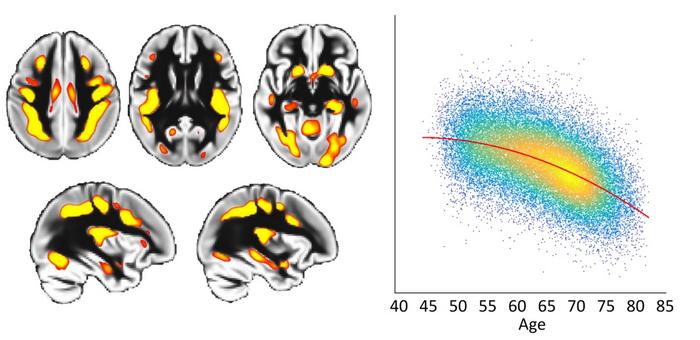In a new study published in Nature Communications, researchers have uncovered the key modifiable risk factors that can impact a vulnerable network of brain regions, potentially increasing the risk of developing dementia.
The researchers had previously identified this ‘weak spot’ in the brain – a specific network of higher-order regions that develop later during adolescence and show earlier degeneration in old age. This brain network is also particularly vulnerable to conditions like schizophrenia and Alzheimer’s disease.
In their latest study, the researchers examined brain scans of over 40,000 UK Biobank participants aged 45 and older. They looked at 161 different risk factors for dementia and ranked their impact on this vulnerable brain network, beyond the natural effects of aging.
“We know that a constellation of brain regions degenerates earlier in aging, and in this new study we have shown that these specific parts of the brain are most vulnerable to diabetes, traffic-related air pollution – increasingly a major player in dementia – and alcohol, of all the common risk factors for dementia,” said Prof. Gwenaëlle Douaud, who led the study.
The researchers classified these ‘modifiable’ risk factors – factors that can potentially be changed throughout life to reduce the risk of dementia – into 15 broad categories, including blood pressure, cholesterol, diabetes, weight, alcohol consumption, smoking, and more.
“What makes this study special is that we examined the unique contribution of each modifiable risk factor by looking at all of them together to assess the resulting degeneration of this particular brain ‘weak spot’,” explained Prof. Anderson Winkler, a co-author from the National Institutes of Health and The University of Texas Rio Grande Valley. “It is with this kind of comprehensive, holistic approach – and once we had taken into account the effects of age and sex – that three emerged as the most harmful: diabetes, air pollution, and alcohol.”
The researchers also made some unexpected genetic discoveries. Prof. Lloyd Elliott, a co-author from Simon Fraser University in Canada, said, “In fact, two of our seven genetic findings are located in this particular region containing the genes of the XG blood group, and that region is highly atypical because it is shared by both X and Y sex chromosomes. This is really quite intriguing as we do not know much about these parts of the genome; our work shows there is benefit in exploring further this genetic terra incognita.”
This comprehensive study sheds crucial light on the critical risk factors for dementia, paving the way for more targeted prevention strategies and interventions. By identifying the brain’s ‘weak spot’ and the modifiable factors that can impact it, the researchers have taken an important step towards understanding and addressing this devastating cognitive decline.


